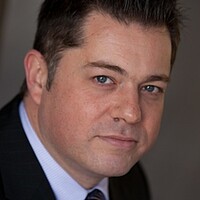Will Shinzo Abe's historic US speech drown out Japan's war denials?
Loading...
| Tokyo
When Shinzo Abe becomes the first Japanese prime minister to address a joint session of the US Congress today it will be under a shadow cast by events of seven decades ago.
For Japan, Prime Minister Abe’s week-long trip to the US that saw him at Harvard on Monday, and in the Oval Office and at a White House state dinner on Tuesday, is meant to demonstrate just how far the Japan-US relationship has come since the Pacific war ended in August 1945.
Mr. Abe has been talking about cooperation on trade and security, underpinned by a shared anxiety over an increasingly assertive China. President Obama standing yesterday with Abe in the Rose Garden reiterated that, "our treaty commitment to Japan’s security is absolute." Obama said he shared Japan's concern at some of China's actions in maritime disputes.
But for all the positive aspects of what former US ambassador to Tokyo Mike Mansfield once described as the most important bilateral relationship in the world, “bar none,” Abe's much desired moment of triumph on Capitol Hill could fall flat unless he grasps the nettle of Japan's wartime legacy.
There are few signs, though, that Abe will disabuse his US critics that he is anything other than a deeply conservative leader with an ideological commitment to rewriting Japan’s modern history.
The clamor from those critics for Abe to issue an explicit apology for Japan’s wartime behavior has grown: Last week 25 House members, led by Japanese-American Mike Honda (D) of Calif., wrote a letter to Japan's ambassador to Washington urging Abe to address sensitive wartime issues in his congressional speech.
Abe, the letter said, should "formally reaffirm and validate" previous apologies.
"To ignore past atrocities," added Rep. Steve Israel (D) of New York, "is to ensure a very troubling future."
70th anniversary of World War 2
The timing of Abe’s address is significant, coming amid a succession of commemorations of key World War II battles, not the least Okinawa and Iwo Jima, and ahead of the 70th anniversary of Japan’s defeat on 15 August 1945. Today, the day of the speech, moreover, is the birthday of Japan’s wartime emperor, Hirohito.
Previous Japanese prime ministers attempted to use the 50th and 60th war anniversaries to mend fences with China and South Korea, where the scars of occupation have yet to heal.
At issue is whether Abe, while staying faithful to his revisionist roots, will nonetheless echo the tenets of his predecessors’ postwar doctrine: a “heartfelt apology” for past wrongs and recognition that Japan had waged a “war of aggression."
During a speech at the Asia-African conference in Jakarta last week, Abe voiced “deep remorse” for Japan’s wartime actions, but stopped short of apologizing.
Tellingly, he suggested in an earlier TV interview that he saw no need to repeat previous official apologies, preferring instead to issue a more “forward-looking” statement.
This drew a predictably angry response from China and South Korea, where Abe’s brand of revisionism is seen as proof of an unrepentant leader, determined to banish his country’s “masochistic” genuflection over events that unfolded well before he was born.
But provoking Japan’s neighbors is nothing new. Beijing and Seoul reacted with predictable fury after Abe’s December 2013 visit to Yasukuni, a Tokyo war shrine that honors Japan’s war dead, including class A war criminals.
And while Abe has twice held bilateral talks with his Chinese counterpart Xi Jinping, a similar meeting with South Korea’s president, Park Geun-hye, has stalled due to Abe’s claim that Japanese military authorities did not coerce tens of thousands of mainly Korean women into working in military brothels.
Comfort women voices still heard
Now, though, his historical revisionism is also attracting criticism in the US, from lawmakers, women’s rights groups, Korean-American activists, and former prisoners-of-war.
Officials in Washington have tried to focus on what they see as the positive impact of Abe’s tenure: progress on the Trans-Pacific Partnership free trade agreement, and bolstering Japan’s contribution to the allies’ joint security framework.
While no breakthrough is expected on free trade this week, Monday saw a high-profile rollout of an enhanced Japanese-US military cooperation, the first revision to US-Japan defense guidelines since 1997.
In return for a “strong” US commitment to Japan’s defense, Tokyo will expand its commitment to the bilateral security alliance in areas such as missile defense and mine sweeping, as well as providing logistical support for US troops in regions such as the Middle East.
While the planned relocation of a US Marine Corps base on Okinawa has foundered amid strong local opposition, Abe has dismissed any notion of moving the base off the island. The US argues that such a move would its military’s ability to act quickly in the event of a local flare-up, perhaps between Japan and China over ownership of the Pacific outcropping that Japanese call the Senkaku and Chinese call the Diaoyu islands.
Abe has also won support from Obama for his plans to loosen the constitutional restraints on Japan’s self-defense forces to allow them to come to the aid of US troops under attack.
Yet Abe will still find it difficult to drown out voices from a dark period in Japan’s history when he delivers his 40-minute speech, in English, on Wednesday. They include that of Lee Yong-soo, a former “comfort woman” who traveled to the US to attend demonstrations planned on Capitol Hill.
"I'm not going to die until we resolve this issue," Lee, 87, told reporters. "I am an honorable daughter of Korea, I am not a comfort woman."





